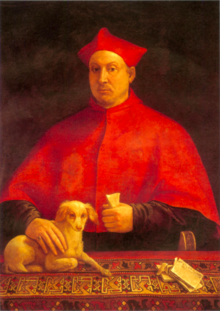Pompeo Colonna
| Pompeo Colonna | |
|---|---|

Portrait by Sebastiano del Piombo, Galleria Colonna, Rome
|
|
| Diocese | Archbishop of Monreale |
| Elected | 14 December 1530 |
| In office | 28 June 1532 |
| Orders | |
| Created Cardinal | 1 July 1517 by Leo X |
| Rank | Cardinal Priest of San Lorenzo in Damaso (1524-1532) |
| Personal details | |
| Born |
May 12, 1479 Rome |
| Died | June 28, 1532 (aged 53) |
| Parents | Girolamo Colonna, Vittoria dei Conti di Pola |
Pompeo Colonna (12 May 1479 – 28 June 1532) was an Italian condottiero, politician, and cardinal. At the culmination of his career he was Viceroy of the Kingdom of Naples (1530-1532) for the Emperor Charles V. Born in Rome, he was the son of Girolamo Colonna, whose father Antonio was second Prince of Salerno; and Vittoria Conti, of the Conti de Poli. His family belonged to the highest rank of nobility both of the City of Rome and of the Kingdom of Naples. Pompeo and his family were hereditary supporters of the Holy Roman Empire (Ghibbelines), and they spent their careers fighting their hereditary enemies, the Orsini family, and defending and expanding their family territories and interests. He played a significant, if sometimes disruptive, role in the Conclaves of 1521 and 1523 on behalf of the Imperial interest. His family commitments and his conclave activities brought Pompeo into conflict with the second Medici pope, Clement VII, whose election he vigorously opposed, and made him a leading figure in the overthrow of Pope Clement and the Sack of Rome in 1527.
Pompeo's father was killed on 4 March 1482, when he was not yet three years old. Young Pompeo was given a rigorous upbringing at Monte Compatrum in the Tusculan hills east of Frascati, under the watchful eyes of his uncles Prospero and Cardinal Giovanni Colonna. He and his first-cousin Marcantonio Colonna, his friend and constant companion, were in constant rivalry with one another, especially in their enthusiasm for military affairs. In 1498, as a young man of eighteen, Pompeo fought alongside his uncle Prospero, Lord of Genazzano and Nemi, Duke of Traetto, Count of Fondi, against the traditional family enemies, the Orsini. His uncle took Pompeo to Naples after the Orsini affair was settled, and introduced the young man to King Federigo I, whose fast friend he quickly became. Pompeo later fought on behalf of the Spanish in several campaigns in 1503, culminating in the Battle of Garigliano (1503), in which Piero de' Medici, the elder brother of Giovanni de' Medici (Pope Leo X) was killed.
It was decided by Pompeo's uncles that he should enter upon an ecclesiastical career, so that he could succeed to the rich benefices and powerful offices enjoyed by Cardinal Giovanni. He became the Cardinal's majordomo, apparently in 1504. With the cooperation of Pope Julius II, Pompeo was named Protonotary Apostolic in 1507. On the death of Cardinal Giovanni Colonna (26 September 1508) who had governed the See of Rieti since 1480, Pompeo was named bishop of Rieti by Pope Julius II on 6 October 1508. Pompeo ruled the diocese until he resigned in 1520 in favor of his nephew, Scipione Colonna. In 1520, just before his resignation, Cardinal Pompeo increased the number of Canons in the Cathedral of Rieti from twenty-eight to forty. The Cardinal was not a disinterested philanthropist, for, though he increased the numbers and prestige of the Canons, his nephew also gained twelve benefices which were at the disposal of the Bishop to reward Colonna followers. When Bishop Scipio Colonna resigned in 1528, Pompeo Colonna again became Bishop of Rieti, until he resigned in the next year in favor of his own secretary, Mario Aligeri. Pompeo Colonna was also abbot of Subiaco and Grottaferrata, again in succession to Giovanni Colonna; he was succeeded in 1513 by his nephew Scipione Colonna.
...
Wikipedia
